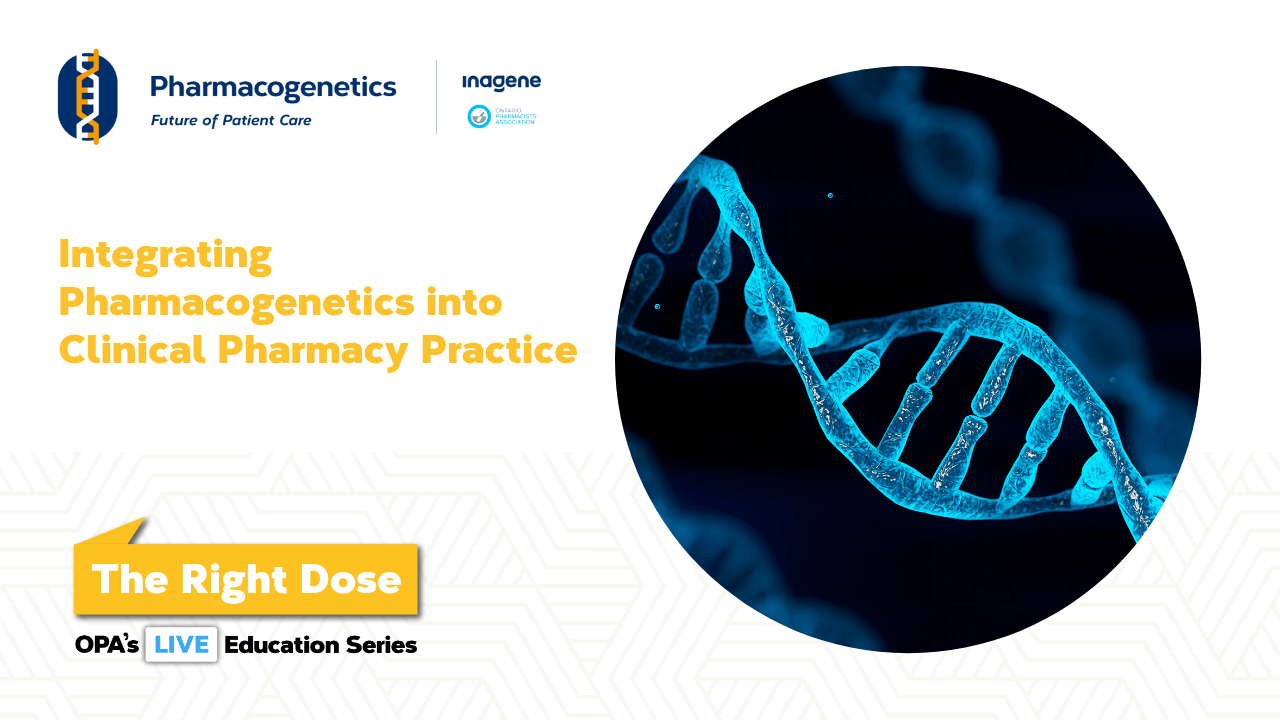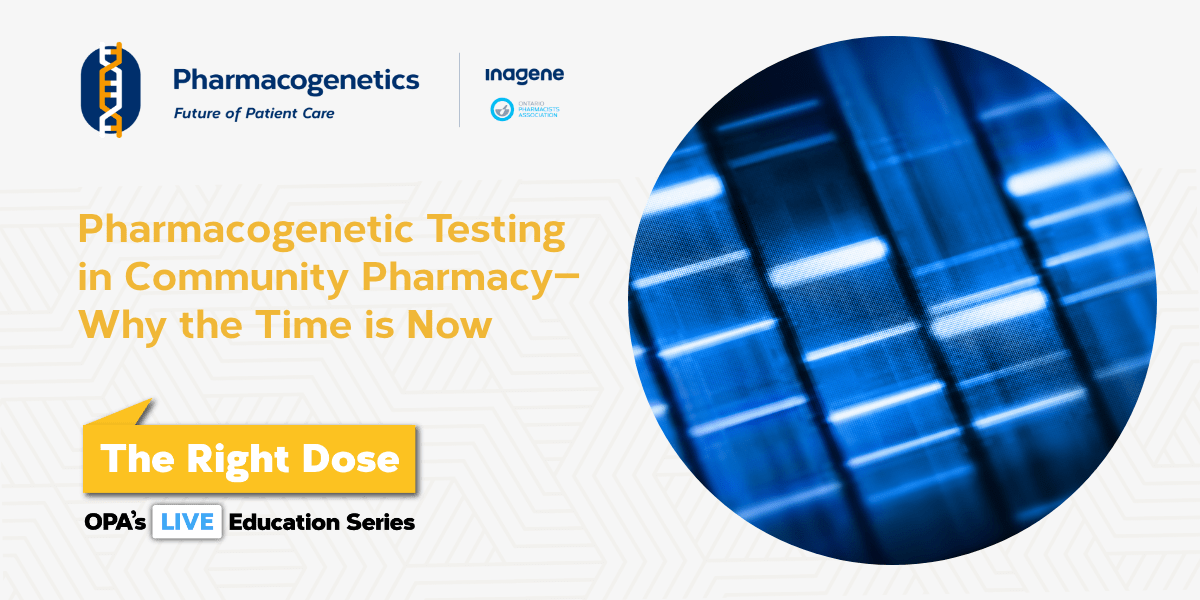
What is Pharmacogenetics?
Pharmacogenetics examines how genes affect an individual’s response to drugs. Using a combination of pharmacology (the study of medications) and genomics (the study of genes and inherited traits), pharmacogenetics allows healthcare professionals to personalize medication usage so that patients achieve the best possible outcomes, while minimizing side effects and safety risks.
Many drugs in today’s market take a “one size fits all” approach, however everyone has a unique genetic makeup that affects drug absorption, efficacy, metabolism, and response. A medication can have varying effects on patients, and it can be difficult to forecast whether it will assist the patient, have no effect, or cause an adverse drug reaction. According to Adverse Drug Reaction Canada, annually, adverse drug reactions in Canada kills between 10,000 to 22,000 Canadians and costs the Canadian healthcare system between $13.7 and $17.7 billion.1 Furthermore, in 2019 Health Canada received more than 96,500 domestic reports of adverse reactions involving a total of 208,383 drugs or natural health products.2

More than 90% of patients have DNA variants that impact their response to a medication.
Enhance Your Practice and Patient Care

Growing consumer awareness and increases in health consciousness has led many patients to want to take responsibility for their health and pharmacogenetics is a value-added service that allows individuals to make informed, safe and responsible decisions about their treatment options. As accessible and informed health care providers that are expanding the types of services and support offered, pharmacies are expected to have added value to support patients. Pharmacogenetic testing enables health care providers to have more accuracy and confidence when identifying which drugs and doses will be most effective for patients before treatment begins, so patients can feel better as quickly as possible and minimize trials of multiple treatments.
Who is Pharmacogenetic Testing For?
Pharmacogenetic testing is for anyone seeking to understand which drugs are likely to work best for them. It can be especially beneficial for patients with a variety of conditions, including chronic pain, and mental health disorders. In a Centre for Addiction and Mental Health (CAMH)-led clinical study published in Translational Psychiatry, pharmacogenetic testing increased remission rates in patients diagnosed with treatment-resistant depression (patients whose condition did not improve after trying at least two antidepressant medications) by nearly 89% compared to treatment as usual. 3 Even those not currently taking medication may benefit from pharmacogenetic testing since the report focuses on DNA (which is fixed), it can be used as a proactive measure so that if a person is prescribed medication in the future, they have an understanding of which drugs would work best for them based on their genetics. It is safe to have a pharmacogenetic test completed at any age, however, the results are not considered accurate and representative of an individual’s genetic expression until the age of two. Pharmacogenetic test results do not change over time, so they can be used throughout an individual’s life.
Pharmacogenetic test results do not change over time, so they can be used throughout an individual’s life.

How to Discuss Pharmacogenetics with Patients

As more medical providers adopt pharmacogenetic testing, pharmacies have more opportunities to lead in providing personalized medicine. The clear benefits in optimizing treatment, reducing side effects and medication waste that pharmacogenetic testing provides empower patients to take control of their health. Pharmacy professionals can play a critical role in assisting in counselling and educating patients prior to taking a test and post-test with their results. Educating patients before they take a test is important so that they understand what a pharmacogenetic test is—that they are typically specific to medications and not disease states. Also, clarifying to a patient how a pharmacogenetic test examines genes for variations that may change how the patient metabolizes or break down a medication is important.
The results from a pharmacogenetic test are typically broken down into categories that are used to help determine which medications are most likely to be effective and safe for the individual based on the presence of specific gene variants known to produce an altered response to one or more commonly used drugs. Pharmacy professionals can use these results to educate patients on potential treatments and/or provide future preventive care counseling as the results can be used throughout a patient’s life.
As a newer precision approach to drug therapy, insurers are recognizing the advantages of pharmacogenetic testing. Aside from being a tax-deductible expense under the Income Tax Act, pharmacogenetic testing can be claimed under the health care spending accounts of most private insurance plans. Some private insurance plans will also reimburse for pharmacogenetic testing through their extended health care benefits under “laboratory diagnostic testing”. If a patient is submitting to a private insurance plan to have the cost of the test reimbursed, most insurers require that the test be ordered via prescription by a licensed health care provider.
Pharmacy Professionals as Medication Experts

As trusted and trained health care providers, pharmacy professionals are well equipped to provide and counsel patients on pharmacogenetic testing. Many pharmacy teams are already trained in alternative precision medicine approaches like therapeutic drug monitoring. Having pharmacogenetic testing as an option for patients helps to differentiate from other pharmacies as it provides a streamlined option for personalized health care and expands your pharmacy’s offerings. Furthermore, it builds patient trust as pharmacogenetic testing aids in evaluating patients’ medications, identifies risk factors like potential adverse reactions before they can happen, and assists patients to feel better more quickly and efficiently.
Resources and Tools
Press Release
References:
- “What Are Adverse Drug Reactions and How Can They Be Prevented.” Adverse Drug Reaction Canada, 9 July, 2021, https://adrcanada.org/.
- “Adverse reactions, medical device incidents and health product recalls in Canada: 2019 summary report.” Government of Canada, 11 Dec. 2020, https://www.canada.ca/en/health-canada/services/drugs-health-products/reports-publications/medeffect-canada/adverse-reactions-incidents-recalls-2019-summary.html.
- “Pharmacogenetic testing shows promise improving symptoms in patients with treatment-resistant depression.” Centre for Addiction and Mental Health, 29 Mar. 2022, https://www.camh.ca/en/camh-news-and-stories/pharmacogenetic-testing-shows-promise-improving-symptoms.




